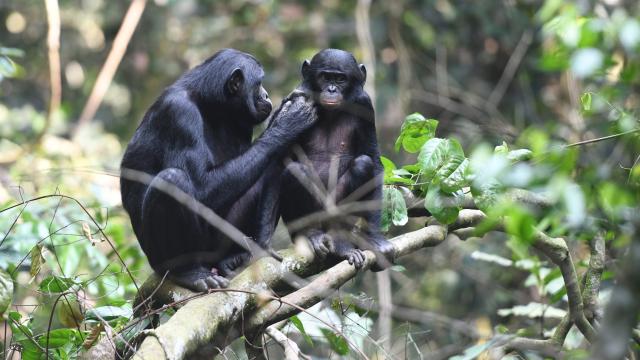Science journalists around the world received one of the silliest corrections yet in our inbox over the weekend, and I would like to share it here with you.
Last Thursday, Cell Press, which publishes well-known science journals like Cell, Current Biology, and Neuron, sent an email with press summaries for papers slated to be published. The title of one of those summaries was, as follows:
“Bonobo mums will literally drag their sons to ovulating females to get more grandchildren.”
“Literally,” I said to my editor Rose Pastore when I read the title. “Literally!” she responded.
The next day, we received an updated email, and the press summary was changed to “Bonobo mums play an active role in helping their sons find a mate.” Still interesting, but perhaps not as interesting as a “literal” dragging. Then came the correction:
CORRECTION: The previous version of this week’s press package included an incorrect title for the press release about the findings of Surbeck et al.: “Males with a mother living in their group have higher paternity success in bonobos but not in chimpanzees.” While bonobo mothers defend their sons mating attempts against other males and the males’ proximity to their mothers allows them to stay at central places in the group, giving them more opportunities to mate, bonobo mothers do not “literally drag their sons to ovulating females to get more grandchildren.” We apologise for the misinterpretation.
Anyway, the brief paper found that male bonobos were more likely to be fathers when their mother was present in the colony than when the mother was absent, versus chimpanzees where no such effect was seen. The results came from four groups of bonobos and seven groups of chimpanzees.
But the initial headline wasn’t wrong, according to the correspondence published in Current Biology:
… A large body of evidence suggests that bonobo mothers also behave in ways that potentially increase the paternity success of their sons. For example, bonobo mothers frequently bring their sons into close spatial proximity with estrous females, protect their sons’ mating attempts from interference by other males, interfere in the mating attempts of other males, and form coalitions with their sons to help them acquire and maintain high dominance rank. Such maternal behaviour is more likely to be effective in bonobos, where the sexes are co-dominant and the highest ranks are consistently occupied by females, than in chimpanzees, where all adult males are dominant over all females.
I’ve reached out to Cell Press to see why they made the correction. As I wrote last week during the Voynich Manuscript fiasco, some news outlets will publish these press summaries verbatim without thinking critically about the paper, so it’s good to see Cell Press striving for accuracy. But thanks anyway for the laugh.
